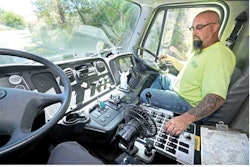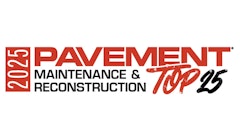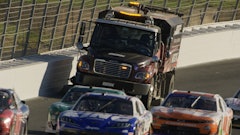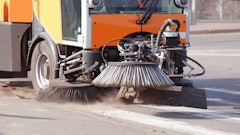The contract sweeping industry has shaken itself out of the doldrums of recent years, with sweeping frequencies up and pricing up or at least stabilized, according to Sylvia Richard, president of the North American Power Sweeping Association (NAPSA).
Richards, president of Asphalt Enterprises, Raleigh, NC, conducted an informal poll of contract sweepers throughout the country and what she learned reinforced what she had been hearing all year and what her company was experiencing.
Richards characterized the sweeping industry as “strong,” adding that it has gradually strengthened every year.
“But, in order for business to be successful and growing they have to invest in their business as well – invest in equipment, training employees, attaining NAPSA’s Contract Sweeper Certification, going to industry events such as National Pavement Expo,” she says. “If you’re willing to invest in yourself then others are willing to invest in you as well.”
Pricing & Frequency
Richards says that unlike the years of the recession, when many property managers were cutting back on sweeping frequency, that’s no longer the case.
“The last two or three years we have actually seen an increase in sweeping frequency, and that’s across the country,” Richards says. “We’re actually hearing about situations where sweeper owners are out there climbing in a sweeper to get some jobs done because there’s that much work for them.”
She says there are number of reasons for the increased frequency – property managers have more money, they’ve realized reduced frequency impacts their parking lot and store traffic, and because they’re worried about slip-and-fall litigation.
Along with increased sweeping frequency is pricing increases or at least stability.
“Property managers are always cost conscious and they always will be,” she says. “Our members want to deliver the best-quality services for the best price we can.”
Richards says the industry has learned how to handle the low-price competition from many third-party providers it struggled with when those providers entered the market before the recession.
“If you want us to sweep, this is the price you have to pay. Or if that’s the rice you want to pay then this is the work you’re going to get,” she says.
She says some of the third-party providers are no longer in business, but some have developed good, strong business models. She says those third-party providers understand the sweeping business are get the price contractors need to do the job. The result is that many contract sweepers have formed good, strong partnerships with some third-party providers.
Richards says many sweeping contractors have learned how to use and work with third-party providers. Her company, Asphalt Solutions, uses work for third-party providers effectively to supplement their other work, and other sweepers have discovered similar approaches to that work.
“We’ve always known those relationships have to be a win-win and for a while that was not the case,” she says. “Sweepers learned they have to say ‘No’ sometimes when they can’t afford to provide the service at that price. And more owners are saying ‘No’.”
The Industry’s Biggest Challenge
Richards says the biggest challenge for the industry is finding qualified drivers, both CDL drivers and non-CDL drivers – and she says the contractors need to take that challenge on individually at each company.
“And we can’t wait,” she says.
She says the driver shortage is the result of the recession, when people stopped pursuing CDL training because there was no demand for drivers.
“Construction was down and you just didn’t see construction trucks on the road. People stopped attending CDL training because they couldn’t get the jobs once they got the training,” Richards says. “Now we’re seeing more construction and the demand for CDL drivers is there but we’re having to play catch-up.”
Richards says there are a number of efforts contractors need to make to find and retaining the drivers they need:
- Move non-CDL drivers to CDL drivers. She says that companies that have a quality driver should help that driver become CDL qualified, even paying for the certification with an agreement the driver will stay with the company for a specified number of years.
- Advertise that that company is investing in driver training
- Keep equipment in good working order
- Provide a good working environment and company culture. “We need to be committed to our employees and we need them to be committed to us,” she says.
“This is the number one concern I’m hearing from everyone – finding and retaining help,” she says. “We as owners and business managers can’t wait for someone else to solve this. We need to solve it ourselves.
“If you promote yourself as a Certified Sweeping Company and if you invest in your company and your employees you’ll reap the benefits from that.”
NAPSA’s Operator Training Program
To help meet the driver challenge and to help contract sweepers improve their operation, separate themselves from their competition and improve job quality and safety, NAPSA has developed a Certified Sweeper Operator (CSO) online training program.
Richards says volunteers in NAPSA worked steadily to develop the CSO. “We’ve taken best practices from contractors and put them all together to help train our workforce,” Richards says, adding that the program will help the sweeping industry attract and keep employees.
“It’s been a tremendous undertaking,” she says. “We probably didn’t know at the beginning how big a job it was. It’s taken countless hours by board members and non-board members and we’re real excited about it.”
In development for at least two years, the full CSO program will have three distinct training modules: parking lot sweeping, construction sweeping and municipal sweeping. Many of the fundamentals will transfer from one module to another but there are also significant differences among the three types of sweeping so each training plan will be separate.
The core of the program is the online training, but once that training has been completed the operator will sit down with the owner or manager to discuss what they’ve learned. “That way an owner can customize the training through the way they operate,” Richards says.
Then the owner or manager has to respond to NAPSA that the operator has passed 100% and they’ve sat down with them to discuss it. Only then will the CSO be awarded to the operator.
“If there’s anything the owner wants to add to the training that’s the place to do it prior to certifying that individual team member,” she says.
The full CSO program will be available to members in the first half of 2017, but the parking lot certification program will be introduced at National Pavement Expo.
“This is huge for the industry and it will strengthen the industry,” Richards says. “It will be great for businesses but it’s a benefit that extends to the customer. Customers will notice it in performance, in quality and in service.”
[sidebar]
NPE Valuable to NAPSA Members
NAPSA President Sylvia Richards says National Pavement Expo is a valuable event in which NAPSA members should participate. She says NAPSA and NPE work together to offer sessions the NAPSA board thinks will benefit the members. This year those sessions are:
- Improve Operator Performance to reduce Costs and Improve Profits & Safety
- Accident Preparedness to Protect Your Company and Your Drivers
- How Data Drives marketing – and How to Make it Work for You
- 2017 Best Practices for Contract Sweepers
- High-Power Leadership Strategies to Motivate, Communicate and Inspire
“You can learn in the classroom but you can also learn outside the seminar – on the exhibit floor talking with exhibitors and networking with other contractors,” Richards says. “I can’t stress enough the importance of being involved in the industry, attending NPE. Being involved and learning from others is the most important thing you can do.”
For details on these NPE sessions and to register visit www.nationalpavementexpo.com.




![Pavement Awards 2025[main]](https://img.forconstructionpros.com/files/base/acbm/fcp/image/2024/05/PavementAwards_2025_main_.665883e4276e8.png?auto=format%2Ccompress&bg=fff&fill-color=fff&fit=fill&h=100&q=70&w=100)








![Pavement Awards 2025[main]](https://img.forconstructionpros.com/files/base/acbm/fcp/image/2024/05/PavementAwards_2025_main_.665883e4276e8.png?ar=16%3A9&auto=format%2Ccompress&bg=fff&fill-color=fff&fit=fill&h=135&q=70&w=240)







